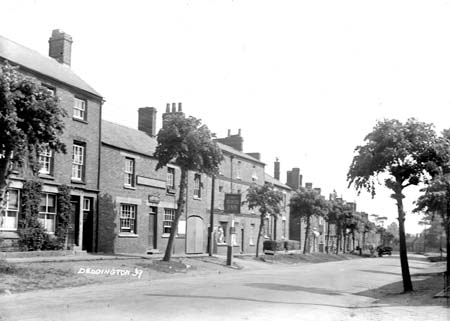Millennium Project
by Jon Malings
The Volunteer (formerly the Flying Horse) was in New Street, on the east side, several houses below Hudson Street. It is number 54 on the Deddington village map drawn up for the 1808 enclosure award. At that time it was owned, freehold, by “Truelove” and described simply as "a cottage"
This pub appears to have started it’s life as a lodging house sometime around 1851 and continued to provide accommodation for travellers at the lower end of the market until at least 1871. By 1858 it was referred to as The Flying Horse and was known by that name until around 1878 when it became The Volunteer.
The Volunteer closed in 1966, the Hotel Russell taking it's place. It is now a private dwelling, Russell House.
This picture of New Street, looking south-east, shows the Volunteer Inn as the second house from the left. It's undated but was probably taken in the late 1920's or early 1930's.
 |
The photo, from the Packer Collection, is reproduced by courtesy of the Centre for Oxfordshire Studies. Our Gallery contains a large number of Deddington photographs from this archive and other sources.
Timeline
Landlords at known dates.
1851 – John Timms – A lodging house for Vagrants. 7 occupants
1858 – Robert Stroud - The Flying Horse. Fined 2s. 6d. for having two quart deficient measure
1861 – James Lewis – The Flying Horse – Victualler, 3 lodgers
1867 – Unknown – James Lewis is living in the High Street
1871 – William G Grace – Axletree maker and Inn Keeper. 3 Lodgers
1872 – William G Grace – Petty Sessions, Wm. Wood attempting to obtain goods of Wm. Grace.
1878 – Thomas Parr – The Volunteer – Temporary transfer of licence to Henry Haynes
1878 – Henry Haynes, late of Dunstew.
1879 – John Wheeler – The Volunteer beer-house – Petty Sessions, Devereux Hore drunk and disorderly
1881 – John Wheeler
1891 – Herbert Mason
1901 – Herbert Mason
1911 – Herbert Mason
In Detail
The 1851 census describes the property as a ”lodging house for vagrants” run by John Timms, a tailor, with Elizabeth his wife and adult son Thomas, also a tailor. There were three couples and a single woman lodging there:John Pratt, shoemaker, his wife Ellen, dressmaker.
Walter Webb, ostler, Ann, his wife, milliner.
George Johnson, agricultural labourer, Mary, his wife, stocking weaver
Sarah Gibson, single woman, lace maker.
By 1858 the property was known as the Flying Horse. Jackson’s Oxford Journal (The Journal) of May 15th reports that at the Petty Sessions, held in Deddington the previous week, Robert Stroud of the Flying Horse, Deddington, was summoned for having in his possession two quart deficient measures. Convicted in 2s. 6d. fine and 10s. costs.
The 1861 census identifies The Flying Horse Inn which is run by James Lewis, victualler, with his wife Ann and their five children. There are also three lodgers:
George Peters, papermaker
Edward Hayes, agricultural labourer
William Lee, painter
Before moving to the Flying Horse James Lewis was at the Crown and Tuns, lower down New Street. He took over the licence for that house in May 1857.
In 1864 James Lewis, presumably still landlord of the Flying Horse, advertised in the Journal: “Important to Farmers - Lewis’s Composition for Killing Mice, James Lewis, New St. Deddington”.
This advert, and others like it, continued to appear over the next few years. By 1867 Mr. Lewis was advertising “The Farmers True Friend – A composition for Foot Rot in Sheep & lice and wounds in Cattle, prepared by James Lewis, High street, Deddington” so, apparently, he was no longer at The Flying Horse.
The 1871 Census does not specifically name the pub, which, by now, is occupied by William G Grace, axletree maker and inn keeper, with his wife Maria, their young grandson William and a domestic servant, Julia Cox. It is still a lodging house; occupants Henry and Eliza Skeels and Thomas Read, all hawkers, all from Cambridgeshire.
William Grace had formerly run the Exhibition/Three Horse Shoes in the Horse Fair. In a Journal advertisement of October 25th 1862, headed “Exhibition Inn, Deddington”, William G Grace begs to inform his friends that he has taken over the above old-established Inn.
A report of the Petty Sessions carried in the Journal on March 8th 1872 mentions that Wm. Wood was committed for trial for attempting to obtain goods of William George Grace.
By 1878 the house had changed it’s name to The Volunteer. The Journal of April 13th notes that the licence of the Volunteer beer-house was temporarily transferred from Thomas Parr to Henry Haynes, late of Dunstew.
Another Petty Sessions report, in the Journal of August 30th 1879, includes the summonse of Devereux Hore, a butcher, who was drunk and disorderly and refused to leave the Volunteer beer-house kept by Mr. John Wheeler.
Earlier that same year Mr. Wheeler had been landlord at the ???Crown and Tuns and been involved in a dispute with the Deddington General Friends Institute. They had used the ??? for their meetings but had lately transferred their allegiance to another house. Mr. Wheeler had kept hold of their safe as security for an alleged debt. The Journal of July 5th reports his summonse at the Petty Sessions.
The 1881 census shows John Wheeler as a beer-house keeper at the Volunteer Inn in the company of his wife and one year old daughter.
Between 1891 and (at least) 1911 the Volunteer was run by Herbert Mason whose family had owned the Axletree making factory in Deddington.